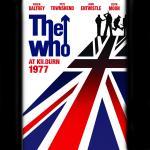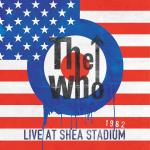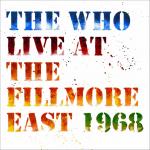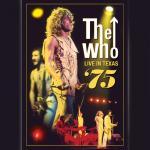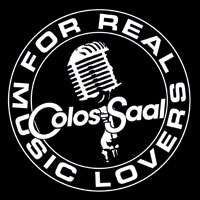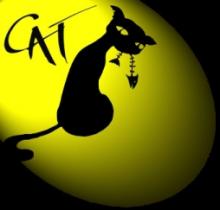Als vor Urzeiten, gemeint ist 1964, ein gewisser Keith Moon die Herren Daltrey, Townshend und Entwistle traf entstand daraus eine Band des Namens THE WHO.
Band:
BiografieThe Who stands alone in rock music. The most explosive live act ever to appear on stage, propelled by the most staggeringly brilliant rhythm section in all popular music, layered with deafening power chords and thunderous vocal fury, the Who transcended its original billing as "Maximum R&B" to become the most musically inventive and structurally innovative band of all. Alone among the great bands, the Who has found itself at the center of every major rock event -- Monterey, Woodstock, the Isle of Wight, the Concert for Kampuchea, Live Aid, the Concert for NYC. In any era, the Who is a touchstone for rock-and-roll greatness.The Who
Together, the four divergent personalities of the Who produced a hurricane. Each of them was a pioneer. Wildman drummer Keith Moon beat his kit with a chaotic elegance; stoic bassist John Entwistle held down the center with the melodic virtuosity of a solo guitarist; raging intellectual Pete Townshend punctuated the epic universality of his songs with the windmill slamming of his fingers across his guitar strings; and Roger Daltrey roared above it all with an impossibly virile macho swagger. They exploded conventional rhythm and blues structures, challenged pop music conventions, and redefined what was possible on stage, in the recording studio, and on vinyl. Never before or since has spiritual and intellectual brilliance sounded so gloriously furious.
Townshend and Entwistle grew up in the Shepherd´s Bush area of London and formed a jazz band together as teenagers. When Daltrey invited Entwistle to join his skiffle and R&B band, the Detours, the bassist suggested bringing Townshend on board as a rhythm guitarist. Soon afterwards, the group added the sixteen-year-old Moon, who had been drumming with the Beachcombers. By 1964, the Detours had changed their name to the Who.
As the group accumulated a local following, Townshend attended the Ealing Art School, where he became exposed to Gustav Metzger´s notions of auto-destructive art. Townshend would soon put these ideas into practice at the Marquee club in London, where he inadvertently smashed his guitar into ceiling and then bashed it into the stage in frustration. Moon later followed suit, and the furious sacrifice of the band´s equipment became a performing signature. Manager Pete Meaden changed the group´s name to the High Numbers in order to appeal to the local Mod audience, but after one single ("I´m the Face"/"Zoot Suit"), the band changed management and reclaimed its prior name. New managers Kit Lambert and Chris Stamp encouraged the group´s explosive approach to soul and rhythm and blues, a style they dubbed "Maximum R&B." Townshend´s original composition, "I Can´t Explain" became the Who´s first single and quickly reached the British Top Ten. In the fall of 1965, "My Generation" with its refrain of "I hope I die before I get old" became the cry of entire generation.
With Lambert´s encouragement, Townshend began to explore narrative alternatives to the conventional three-minute pop song. The title track to A Quick One (While He´s Away), a ten-minute mini-opera, proved an immediate success. 1967´s concept album The Who Sell Out, a mock radio broadcast complete with commercials, represents a triumph of musical innovation, satire, and searing rock and roll. The brilliant single "I Can See for Miles," took the band to the Top Ten in America for the first time. Combined with a blistering appearance at the Monterey Pop Festival earlier that year, the album cemented the Who´s status as pop´s most innovative ensemble.
The Who soared beyond even the greatest expectations with the double concept album Tommy, the first successful rock opera. An allegorical tale of a "deaf, dumb, and blind" boy traumatized by the murder and cover-up of his mother´s lover, the album constitutes a triumph for all: Daltrey´s vocal characterizations give life to Townshend´s innovative narrative, and the soulfulness of Moon and Entwistle´s rhythm work validates the high art as authentic rock and roll. The band´s stunning live presentation of the songs at Woodstock that year firmly established the Who as the world´s greatest live act.
Momentarily clearing the decks with a teeth-rattling set of older singles and covers, the Who released the staggering Live at Leeds the following year. Still regarded as the greatest live recording ever made, the set documented the evolution of the band´s playing: The Who weren´t simply becoming more cerebral, they were growing rhythmically and sonically as well. Influenced by the teachings of his guru, Meher Baba, Townshend began work on Lifehouse, a futuristic science fiction rock opera that anticipated spiritual decline in a computerized world of virtual reality. Decades ahead of its time, the project stalled, but the resulting songs were reassembled on Who´s Next, critically regarded as the band´s best work yet, a grand and sophisticated collection of tracks featuring a remarkably tasteful mixture of electronics, synthesizers and pounding rock.
Townshend returned to rock opera with Quadrophenia in 1973. Eschewing fantasy and choosing to look backwards into the past instead, Townshend crafted a portrait of a ´60s mod, a lad with a personality divided into four equal parts, each represented by one of the bandmembers. Taking advantage of the recent advent of quadraphonic sound, the band left its contemporaries behind once and for all, charting musical territory that has still yet to be fully explored three decades later.
As the bandmembers began to pursue their own individual projects, the Who recorded with less frequency. The surprisingly personal The Who By Numbers appeared in 1975, with Townshend revealing more about his own struggles than ever before, and Daltrey finding the vocal subtlety to match it. After a three-year hiatus, the Who reemerged in 1978 with the stunning Who Are You, an unapologetic sweeping away of any suggestions that the band might no longer belong at the top of the heap. But in the midst of this triumphant comeback, tragedy struck when Keith Moon died in his sleep of an Heminevrin overdose on September 7, 1978. The band continued on with former member of the Small Faces, Kenny Jones , taking over on drums and John "Rabbit" Bundrick on keyboards, but although the Who continued to electrify live audiences, something irretrievable had been lost.
In 1981 the Who released Face Dances, featuring the hit, "You Better, You Bet," and followed with It´s Hard and a farewell tour in 1982. The live Who´s Last (1984) documented what were then thought to be the final Who shows. The group reunited to play Live Aid in 1985, and in 1989, the Who embarked on a massively successful 25th anniversary tour of America.
In honor of Roger Daltrey ´s 50th birthday, the Who performed two live shows at New York´s famed Carnegie Hall in 1994. The band reunited again in 1996 to perform the Quadrophenia at the Prince´s Trust concert in Hyde Park and stayed together to tour the United States the following summer. In October 2001, the Who delivered a rousing performance at the Concert for NYC benefit, providing a joyful, cathartic release for the grieving families of the victims of the September 11 attacks. But tragedy for the band struck again in June, 2002, when, on the eve a North American tour, John Entwistle passed away at the age of 57 in Las Vegas´ Hard Rock Hotel.
In spite of the loss of Moon and Entwistle, the Who remains the standard-bearer for great live rock and roll. The 21st century has sparked a resurgence in the creative collaboration between Townshend and Daltrey: The 2004 greatest hits collection, Then and Now features two excellent new songs, "Real Good Looking Boy" and "Old Red Wine," and the thundering North American tour that followed put any lingering doubts to rest. The Who is forever Maximum R&B.
Quelle: http://www.thewhomovie.com/DiscografieVon http://www.thewho.info
In Deutschland:
My Generation - 1965 Decca LP
Musik Fur Alle: The Who The Beat - 1966 Decca LP
Reissue of "My Generation"
The Who - 1966 Polydor LP
The Who Sell Out - 1967 Polydor LP (front cover)
The Who Sell Out - 1967 Polydor LP (back cover)
The Best Of The Who - 1968 Polydor LP
Tommy - 1969 Polydor LP
A Quick One - 1970 Polydor LP
True stereo, except for "See My Way" and "So Sad About Us"
A Quick One - 1970 Polydor LP
True stereo, except for "See My Way" and "So Sad About Us"
The Who & The Jimi Hendrix Experience - 1970 Karussell LP
Live At Leeds - 1970 Polydor LP
These Are The Who Live At Leeds - 1970 Polydor LP (front cover)
Fan Club Edition with studio "Heaven And Hell"
These Are The Who Live At Leeds - 1970 Polydor LP (back cover)
Fan Club Edition with studio "Heaven And Hell"
The Who Sell Out - 1970 Karussell LP
2 LP - "The Who Sell Out" & "A Quick One" (mono)
Who´s Next - 1971 Polydor LP
Meaty Beaty Big And Bouncy - 1971 Polydor LP
Tommy (London Symphony Orchestra) - 1972 ODE LP
Vinyl pressed in Germany, cover printed in UK
Pop History Vol. 4 - 1972 Polydor LP
Quadrophenia - 1973 Polydor LP
Odds & Sods - 1974 Polydor LP
Tommy (Soundtrack) - 1975 Polydor LP
Club Edition
Tommy (Soundtrack) - 1975 Polydor 8-Track
Volume 2
Who By Numbers - 1975 Polydor LP
The Who - 1975 Polydor LP
The Greatest Rock Sensation The Who - 1975 Karussell LP
Who Are You - 1978 Polydor LP
The Kids Are Alright - 1979 Polydor LP
Quadrophenia (Soundtrack) - 1979 Polydor LP
The Who Sell Out - 1980 Polydor LP (reissue)
Face Dances - 1981 Polydor LP
Once Upon A Time - 1981 Polydor LP
The Who - 1981 Amiga LP
Former East Germany release
Phases - 1981 Polydor Box Set (back cover)
Marketed in Germany and UK, manufactured in Germany
My Generation - 1981 Polydor LP
Included in "Phases"
A Quick One - 1981 Polydor LP
Included in "Phases" - True stereo except for "See My Way" and "So Sad About Us"
The Who Sell Out - 1981 Polydor LP (front cover)
Included in "Phases"
Tommy - 1981 Polydor LP
Included in "Phases"
Live At Leeds - 1981 Polydor LP
Included in "Phases"
Who´s Next - 1981 Polydor LP
Included in "Phases"
Quadrophenia - 1981 Polydor LP
Included in "Phases"
Who By Numbers - 1981 Polydor LP
Included in "Phases"
Who Are You - 1981 Polydor LP
Included in "Phases"
Pop Heroes - 1981 Polydor LP
Best Of The Sixties - 1982 Karussell LP
My Generation - 1982 Karussell LP
"Best of" compilation - not a reissue of the Who´s first LP
It´s Hard - 1982 Polydor LP
Tommy - 1983 Polydor CD
Who´s Next - 1983 Polydor CD
Who´s Last - 1984 MCA LP
The Best Of The Who - 1984 Polydor LP (reissue)
Who´s Next - 1985 Platinum LP
The Singles - 1985 Polydor CD
Quadrophenia - 1986 Polydor CD
Live At Leeds - 1987 Polydor CD
A Quick One - 1988 Polydor CD
Pure mono release
The Who Sell Out - 1988 Polydor CD
Who´s Last - 1988 Polydor CD
Odds & Sods - 1989 Polydor CD
Who By Numbers - 1989 Polydor CD
Who Are You - 1989 Polydor CD
The Kids Are Alright - 1989 Polydor CD
Face Dances - 1989 Polydor CD
Rarities Vol. 1 & Rarities Vol. 2 - 1990 Polydor CD
The Who Live - 1990 MCA CD
Single CD - Misleading cover of "Who´s Last"
The Who Live - 1991 MCA CD
Single CD - Misleading cover of "Who´s Last"
It´s Hard - 1993 Polydor CD
Remastered version of 1983 CD
Tommy (Soundtrack) - 1993 Polydor CD
Quadrophenia (Soundtrack) - 1993 Polydor CD
Thirty Years Of Maximum R&B - 1994 Polydor CD (Box set)
Live At Leeds - 1995 Polydor CD
Remixed & Remastered
A Quick One - 1995 Polydor CD
Bonus tracks remixed, complete CD remastered
The Who Sell Out - 1995 Polydor CD
Remixed & Remastered
Who´s Next - 1995 Polydor CD
Remixed & Remastered
Tommy - 1996 Polydor CD
Remixed & Remastered
Quadrophenia - 1996 Polydor CD
Remixed & Remastered
My Generation - The Very Best Of The Who - 1996 Polydor CD
Remixed & Remastered (may be pirate)
The Who - 1996 Sonotec CD
"Shaped" Interview CD
Who By Numbers - 1996 Polydor CD
Remixed & Remastered
Who Are You - 1996 Polydor CD
Remixed & Remastered
Face Dances - 1997 Polydor CD
Remixed & Remastered - Digital skip on "It´s In You"
It´s Hard - 1997 Polydor CD
Remixed & Remastered
The Who - 1997 Eurosound CD (Promo)
The Who - 1997 Eurosound CD (Promo)
Wild Collection - 1997 Grifon CD
Odds & Sods - 1998 Polydor CD
Remixed & Remastered
The Who Digitally Remastered - 1998 Bell CD
Live At Leeds (Deluxe Edition) - 2001 Polydor CD
A Quick One - 2001 Polydor LP
This release uses the USA Decca "Happy Jack" mixes, including an uncredited "Happy Jack" as the last track. Issued on 180 Gramm and standard vinyl
Live At Leeds - 2001 Polydor LP
180 Gramm pressing - Original track listing
Tommy - 2001 Polydor CD
Remixed & Remastered version with a Universal sticker indicating "Enhanced Sound Quality"
The Ultimate Collection - 2002 Polydor CD
2 CD set
The Ultimate Collection - 2002 Polydor CD (Promo)
Who By Numbers - 2003 Polydor LP (180 Gramm)
Live At The Royal Albert Hall - 2003 Steamhammer CD
Then And Now - 2004 Universal CD (Promo)
Box Set B-Sides - 2004 Universal CD
"Pictures Of Lily"
The Who Sell Out - 2005 Polydor LP (Front cover)
(180G Heavy Vinyl)
The Who Sell Out - 2005 Polydor LP (Back cover)
(180G Heavy Vinyl)
Endless Wire - 2006 Polydor CD (Deluxe Edition)
2CD version with no bonus tracks. Laminated cover
Tommy Live - With Special Guests DVD 2006
Quadrophenia Live- With Special Guests DVD 2006
Tommy & Quadrophenia Live 3-DVD 2006
www
Reviews
Das gleiche Problem wie mit "Tommy”: Auch diese DVD ist, wenn auch zum "günstigen" Preis, bereits in der Dreifach-Ausgabe enthalten, auch hier gibt es außer einer 82-minütigen Quadrophenia-History und


